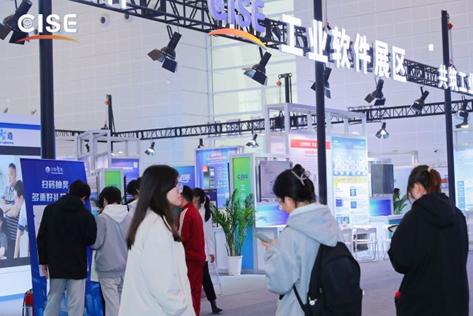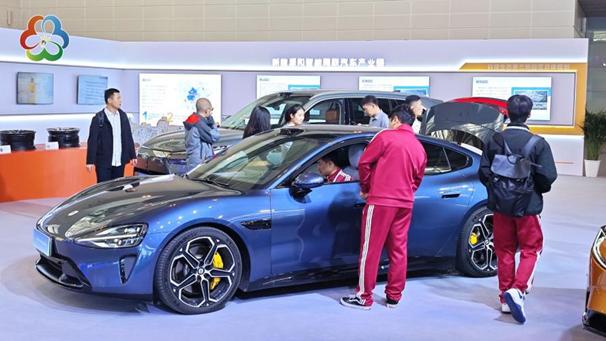
The wave of new technologies represented by generative AI is promoting changes in software technology, models, and ecology, and giving birth to new growth points in the industry. At the 2024 China International Software Expo held last week, reporters from "China Electronics News" and many domestic software companies The representatives chatted...
Computing architecture and software innovation paradigms are being “reconstructed” by AI
Currently, the new generation of artificial intelligence has set off a disruptive change in the software industry. Li Shuchong, vice president of China Electronics Cloud, said in an interview with a reporter from China Electronics News that the computing technology architecture system is being "reconstructed" again. From the perspective of computing power, the computing architecture centered on "intelligent computing" or "intelligent integration" will replace the traditional computing power architecture system based on general computing, correspondingly from the underlying chip to the platform layer technology represented by cloud computing. and products will be further iterated; from the model side, the model architecture represented by Transformer will be further iteratively upgraded, and some new computing architectures will continue to emerge.
At present, the computing system dominated by CPU in the past few decades is accelerating the shift to the AI computing system dominated by GPU. In the future, almost all software and hardware will have reasoning capabilities, and their computing cores will become a computing model dominated by GPU AI computing power and supplemented by traditional CPU computing. Public data shows that in the new computing power market, more than 50% of new demand is driven by AI. AI computing power demand has taken over the mainstream, and this trend continues to expand.
At the same time, the innovation paradigm in the software industry is changing. Li Shuchong pointed out that from large models to industry models to specific application scenarios, the MaaS model will accelerate innovation in the software industry. "Human-machine collaboration" using "intelligent agents" will become the mainstream innovation model in the software industry. In the future, it will not only be “coders” who write code. Computers will be responsible for most of the coding work, and humans will play more of an architect role.

Industrial Software Exhibition Area of Software Expo
For example, in the industrial field, CAD (computer-aided design software) is developing towards cloudization and intelligence. From the perspective of market demand, high-end CAD usually requires powerful solid and surface modeling functions, efficient large-volume assembly performance, and the ability to support industries with complex design requirements. The introduction of AI will promote CAD systems to achieve more efficient intelligent analysis and decision-making in the design process. Through algorithm optimization and data analysis, it will help designers quickly generate and evaluate design plans, improving design efficiency and accuracy.
“We pay special attention to the development of AI+CAx in the industrial field. The integration of artificial intelligence technology and the research and development of large industrial software models will drive us forward on the road of technological progress, open up new application scenarios, and enhance our capabilities while facilitating users. Competitiveness." said Liu Yufeng, executive deputy general manager of Guangzhou Zhongwang Longteng Software Co., Ltd. According to him, Zhongwang Longteng has already formed alliances with leading users in electronic high-tech, automobiles, ships, aviation and other fields, hoping to integrate industry application scenarios and industrial knowledge into the software development system to jointly build China's high-end CAD software.
Chinese and foreign software manufacturers actively explore innovative applications of AI
"No matter which industry you are in, no matter whether you are large or small, artificial intelligence will touch all areas of the company's finance, human resources, customer experience, procurement, etc." Xu, Global Vice President of SAP (China) Co., Ltd. Zhengchun said. As the world's largest enterprise application software manufacturer, SAP chooses to do commercial AI, embed AI into enterprise solutions, and release AI capabilities within the enterprise's existing systems.
According to a report by Morgan Stanley, the impact of AI on the global economy in the next three years is estimated to reach $4.1 trillion, equivalent to one year's GDP of the entire Germany. "According to SAP's estimates, taking a sample customer of 20,000 employees, if AI is embedded into the end-to-end business process, enterprise users will achieve cost savings of 76 million per year. As a leading enterprise application software, SAP provides We are ready to help our customers enjoy the dividends of AI,” said Xu Zhengchun.
According to him, this year and next year, SAP will invest US$1 billion in special investments in AI. "AI relies on the ecosystem to create a win-win situation. So far, we have cooperated with more than 80 advanced AI suppliers to build the SAP-AI platform. Currently, 22 AI models have been connected to SAP-AI. Launching over 100 new AI features and scenarios.”
As one of the largest software manufacturers in China, ChinaSoft International is also actively embracing the AI technology wave. "Generative artificial intelligence, especially the emergence of large models, has brought disruptive changes to the software industry. It not only significantly improves the efficiency of software development, but also spawns new application scenarios. The powerful generation capabilities of large models make software It can better understand and respond to user needs and provide more intelligent and personalized services," Liu Gang, senior vice president of ChinaSoft International Co., Ltd., said in an interview with China Electronics News.
According to him, in terms of end-to-end large model application services, Chinasoft International provides users with full-process services from large model planning and design to actual application deployment, covering many aspects such as model migration, training, fine-tuning and integration, and can help customers Quickly build exclusive large model applications; at the same time, it can also deeply integrate large models with industry knowledge to provide customers with customized AI solutions; in addition, Chinasoft International has also developed a series of "Question Series" agents, LMOps platforms, etc. AI products provide customers with one-stop AI solutions.
As the largest enterprise software manufacturer in China, No. 1 in Asia-Pacific, and one of the top ten in the world, UFIDA has proposed the innovative concept "BIP" (Business Innovation Platform) to replace ERP, emphasizing the in-depth application of cloud computing, big data, and AI. These three core technologies of enterprise digital intelligence realize the cloudification, dataization, intelligence, globalization, mobility and collaboration of enterprise software.
"As a representative of the new generation of enterprise software, UFIDA BIP is a service cluster that integrates platform, application and ecology, including a powerful digital intelligence platform base, rich field and industry applications, and a large-scale ecological system, which can easily It can better meet the requirements of enterprises to eliminate information islands and integrate applications. In addition to realizing the integration of industry and management within the enterprise, the value of "Wang Wenjing, chairman and CEO of UFIDA, told a reporter from China Electronics News.
From the perspective of software industry development, the introduction of AI technology has injected new vitality into the software industry and also brought innovation power to software manufacturers. “After experiencing active innovation and evolution in concept innovation, technology upgrading, product replacement, business transformation, industrial ecology, and market globalization, China’s new generation of enterprise software has become competitive in the global market, has broad development prospects, and can be used in the future. Period." Wang Wenjing said with emotion.
“AI+” industry application scenarios continue to expand
From busy streets to fields, from precision-operated factories to warm homes, a variety of innovative software applications extend AI's reach to every corner around people at an unprecedented speed and breadth.
With the help of AI, intelligent driving has become a hot area that domestic and foreign automobile manufacturers are focusing on. "Voice interaction methods based on generative AI are rapidly gaining popularity in the field of cockpit interaction, which has brought about huge innovations in the interaction logic of smart cockpits. We have long-term cooperation with leading domestic and foreign AI companies in smart cockpits, smart driving, etc. to explore solutions. And with the help of software and hardware collaborative manufacturing capabilities, we can provide more competitive software and hardware services to vehicle customers and end users," Wang Jianfeng, chairman of Ningbo Joyson Electronics Co., Ltd., told a reporter from China Electronics News.

As an industrial enterprise focusing on the R&D and manufacturing of intelligent driving systems, automotive safety systems, new energy vehicle power management systems, etc., Joyson Electronics is not only a beneficiary of artificial intelligence technology, but also a practitioner of the deep integration and application of artificial intelligence technology and software. . According to reports, Joyson Electronics has regarded AI as one of its mid- and long-term development strategies to improve productivity. From product concept design to mass production, from optimization of production processes to improvement of quality control, it has created an internal end-to-end AI scenario.
As AI technology accelerates its iteration, smart factories are also continuing to evolve. "We have implemented intelligent production scheduling through large model training and APS (Automatic Planning and Scheduling), simplifying the tedious process of manual sorting and summarization. At the same time, we use AI vision to identify defective products, which greatly reduces the manual workload. For the factory , The cost reduction and efficiency enhancement effect brought by AI is very obvious," said Bai Jie, account director of Ningbo Jiwang Information Technology Co., Ltd.
It is reported that the company's business covers many key industrial fields such as die-casting, injection molding, machining, auto parts, home appliances, new energy, electronics and medical equipment, and has successfully provided wisdom to more than 400 leading companies of different sizes and industries. Factory solution.
"In the past year, the development speed of AI has exceeded any historical period, but we are still in the early stages of the AGI (general artificial intelligence) revolution." Wu Yongming, CEO of Alibaba Group and chairman and CEO of Alibaba Cloud Intelligence Group, said, "The biggest imagination of generative artificial intelligence is not to create one or two new super apps on the mobile phone screen, but to take over the digital world and change the physical world."